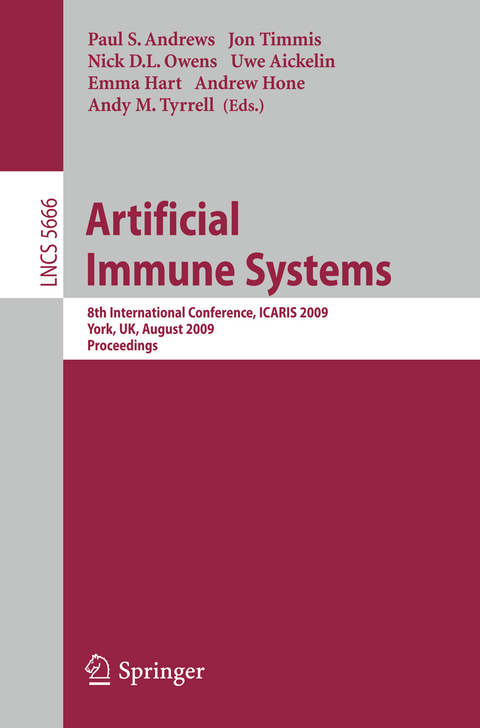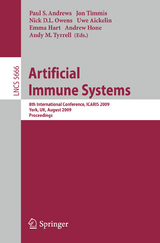Artificial Immune Systems
Springer Berlin (Verlag)
978-3-642-03245-5 (ISBN)
Immune System Modeling.- Agent Based Modeling of Lung Metastasis-Immune System Competition.- Using UML to Model EAE and Its Regulatory Network.- Non-deterministic Explanation of Immune Responses: A Computer Model.- Dendritic Cell Trafficking: From Immunology to Engineering.- A Hybrid Agent Based and Differential Equation Model of Body Size Effects on Pathogen Replication and Immune System Response.- Nonself Detection in a Two-Component Cellular Frustrated System.- Questions of Function: Modelling the Emergence of Immune Response.- Object-Oriented Refactoring of Existing Immune Models.- Mathematical Model of HIV Superinfection and Comparative Drug Therapy.- Theoretical Aspects of Artificial Immune Systems.- Exploration of the Dendritic Cell Algorithm Using the Duration Calculus.- On AIRS and Clonal Selection for Machine Learning.- A Theoretical Analysis of Immune Inspired Somatic Contiguous Hypermutations for Function Optimization.- Comparing Different Aging Operators.- Efficient Algorithms for String-Based Negative Selection.- T Cell Receptor Signalling Inspired Kernel Density Estimation and Anomaly Detection.- Applied Artificial Immune Systems.- An Immuno-engineering Approach for Anomaly Detection in Swarm Robotics.- An Immune-Inspired Approach to Qualitative System Identification of the Detoxification Pathway of Methylglyoxal.- Application of AIS Based Classification Algorithms to Detect Overloaded Areas in Power System Networks.- Artificial Immune System Applied to the Multi-stage Transmission Expansion Planning.- Immune Learning in a Dynamic Information Environment.- Unsupervised Structure Damage Classification Based on the Data Clustering and Artificial Immune Pattern Recognition.- A Sense of 'Danger' for Windows Processes.- An Immunity Inspired Real-TimeCooperative Control Framework for Networked Multi-agent Systems.- Managing Diversity on an AIS That Solves 3-Colouring Problems.- An Error Propagation Algorithm for Ad Hoc Wireless Networks.- Grammar-Based Immune Programming for Symbolic Regression.- A New Algorithm Based on Negative Selection and Idiotypic Networks for Generating Parsimonious Detector Sets for Industrial Fault Detection Applications.- Parametric Modelling of a Flexible Plate Structure Using Artificial Immune System Algorithm.- A Hybrid Approach for Learning Concept Hierarchy from Malay Text Using GAHC and Immune Network.- An Immune Inspired Algorithm for Solving Dynamic Vehicle Dispatching Problem in a Port Container Terminal.
| Erscheint lt. Verlag | 28.7.2009 |
|---|---|
| Reihe/Serie | Lecture Notes in Computer Science | Theoretical Computer Science and General Issues |
| Zusatzinfo | XI, 343 p. |
| Verlagsort | Berlin |
| Sprache | englisch |
| Maße | 155 x 235 mm |
| Gewicht | 545 g |
| Themenwelt | Informatik ► Software Entwicklung ► User Interfaces (HCI) |
| Mathematik / Informatik ► Informatik ► Theorie / Studium | |
| Schlagworte | AIS • Algorithm analysis and problem complexity • Anomaly Detection • Artificial Intelligence • Bioinformatics • bioinspired algorithms • classification • Clustering • combinatorial optimization • computational immunology • Data Mining • distributed AI • evolutionary computation • gene expression • Genetic algorithms • genetic programming • Hardcover, Softcover / Informatik, EDV/Informatik • immune networks • immunoinformatics • Intrusion Detection • Kernel • Kernel Methods • machine learning • malware detection • Metaheuristics • Modeling • multi-agent system • Multi-agent Systems • negative selection • Ontology Learning • Optimization • Parametric modeling • particle swarm optimisation • pattern recognition • Robotics • semantic web • Simulation • Tabu Search • wireless sensor networks |
| ISBN-10 | 3-642-03245-1 / 3642032451 |
| ISBN-13 | 978-3-642-03245-5 / 9783642032455 |
| Zustand | Neuware |
| Haben Sie eine Frage zum Produkt? |
aus dem Bereich




